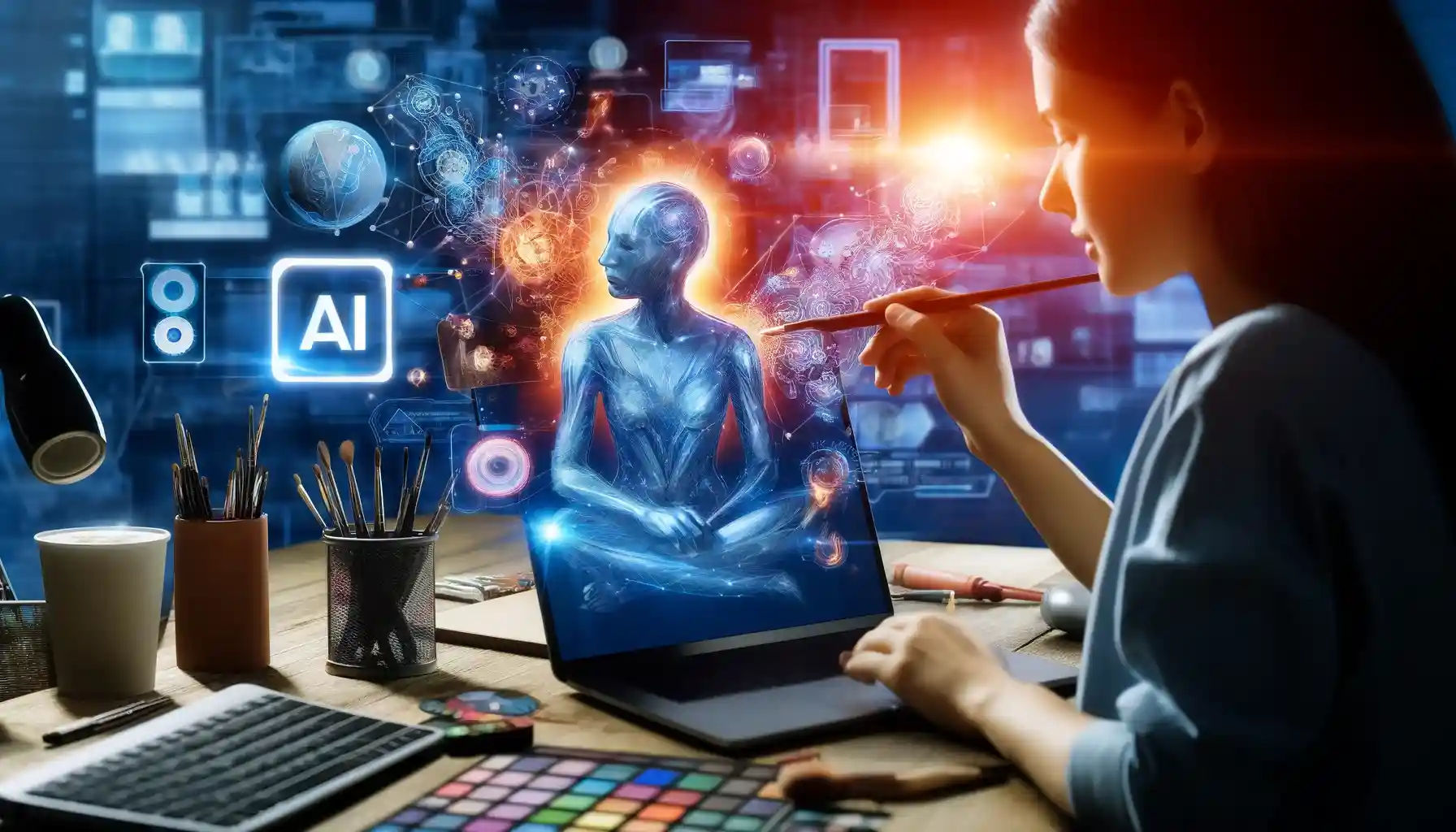The creative process has long been considered a distinctly human domain. From the lyrical verses of poets to the captivating narratives of novelists, human ingenuity has driven the creation of content that informs, entertains, and inspires. However, the landscape of content creation is undergoing a dramatic shift with the emergence of Artificial Intelligence (AI). AI-powered tools are revolutionizing the way content is created, offering a new dimension to the creative process. This blog post delves into the transformative impact of AI on content creation, exploring its potential to streamline workflows, boost efficiency, and unlock new avenues for creative expression.
A Brave New World: Exploring the Potential of AI Content Creation
The integration of AI into content creation offers a multitude of benefits for businesses and individuals alike. Here are some key areas where AI is making a significant impact:
- Content Ideation and Brainstorming: AI can assist with overcoming writer’s block and generating fresh content ideas. AI tools can analyze vast amounts of data, including trending topics, audience preferences, and competitor content, to suggest relevant ideas that resonate with your target audience.
- Content Generation at Scale: AI can automate the production of certain types of content, such as product descriptions, social media posts, and even basic blog articles. This frees up content creators to focus on more strategic tasks like developing content plans and crafting high-level content pieces.
- Data-Driven Content Optimization: AI can analyze content performance data to identify what resonates with your audience and what falls flat. This data-driven approach allows you to continuously refine your content strategy and tailor your content to maximize engagement.
- Personalized Content Delivery: AI can be used to personalize content for individual users based on their demographics, interests, and online behavior. This level of personalization can create a more engaging and immersive content experience for your audience.
- Enhanced Content Quality: AI tools can assist with grammar and style checking, ensuring your content is polished and error-free. Additionally, AI-powered plagiarism checkers can help ensure your content is original and avoids copyright infringement.
A Deeper Dive: Demystifying AI Content Generation
Let’s take a closer look at how AI actually generates content. Here are some of the underlying technologies at play:
- Natural Language Processing (NLP): NLP allows AI to understand the nuances of human language, including grammar, syntax, and semantics. This enables AI to analyze existing content, identify patterns, and generate content that is grammatically correct and reads naturally.
- Machine Learning (ML): Machine learning algorithms are trained on massive datasets of text and code. Through continuous learning, these algorithms become adept at generating human-quality content that is relevant to a specific topic or style.
- Deep Learning: Deep learning is a subfield of machine learning that utilizes artificial neural networks. These complex networks enable AI to analyze and understand intricate relationships within data, allowing for the generation of even more sophisticated and creative content.
By leveraging these technologies, AI content creation tools are constantly evolving and pushing the boundaries of what’s possible.
Expanding on Content Ideation and Brainstorming:
Overcoming writer’s block and generating fresh content ideas can be a constant struggle for content creators. AI can be a valuable asset in this regard.
AI-powered brainstorming tools can analyze a variety of data sources, including:
- Industry trends: AI can identify emerging trends and topics within your industry, providing a springboard for new content ideas. For instance, AI can analyze news articles, industry reports, and social media conversations to identify hot-button issues and trending themes that your target audience is interested in.
- Audience behavior: AI can analyze user search queries, social media conversations, and website traffic data to understand what content interests your target audience. By analyzing this data, AI can identify gaps in your content strategy and suggest topics that your audience is actively searching for but haven’t been addressed yet.
- Competitor analysis: AI can analyze your competitors’ content strategy to identify gaps and opportunities for differentiation. By analyzing your competitors’ most popular content and social media posts, AI can help you understand what resonates with your target audience and develop unique content angles that set your brand apart.
This multi-pronged approach allows AI to move beyond simply suggesting random keywords or topics. By synthesizing a variety of data sources, AI can suggest a range of relevant content ideas that align with your audience’s needs, interests, and the current content landscape. This empowers content creators to move beyond the initial brainstorming phase and begin developing content that is more likely to resonate with their target audience and achieve their content marketing goals.
AI-Powered Efficiency: Streamlining Workflows and Boosting Productivity
- One of the most significant advantages of AI in content creation is its ability to streamline workflows and boost overall productivity. Here’s a closer look at how AI is transforming the content creation process:
- Automated Content Scheduling: AI can automate the scheduling of content across various social media platforms and other marketing channels. This frees up content creators from the time-consuming task of manually scheduling posts, allowing them to focus on other creative endeavors like content ideation, strategy development, and in-depth content creation.
- Content Repurposing and Summarization: AI can automatically repurpose existing content into different formats, such as converting blog posts into social media snippets or infographics. This allows you to maximize the value of your content and extend its reach across different audiences. For example, AI can extract key takeaways from a lengthy blog post and convert them into bite-sized social media posts, ensuring your audience receives the information in a format that aligns with their preferred consumption style.
- Real-Time Content Optimization: AI can monitor audience engagement metrics in real-time and suggest adjustments to optimize content performance. For instance, AI can recommend modifying headlines or adding visuals based on which elements resonate most with your audience. This real-time feedback allows content creators to continuously refine their content and ensure it achieves maximum engagement.
- Content Collaboration and Management: AI-powered content management systems can streamline collaboration between content creators, editors, and marketing teams. These systems can track content progress, assign tasks, and ensure everyone is working on the same version of a document. This centralized platform fosters better communication and collaboration, ultimately leading to a more efficient content creation process.
The Human-AI Symbiosis: Striking a Balance for Content Creation Success
While AI offers a plethora of benefits for content creation, it’s crucial to remember that AI is a tool, not a replacement for human creativity and strategic thinking. The most successful approach lies in fostering a human-AI symbiosis, where AI and human expertise work together to achieve optimal results. Here are some key considerations for striking the right balance:
- Maintaining Brand Voice and Identity: AI-generated content should complement your brand voice and personality. Use AI tools to generate content ideas and drafts, but don’t rely solely on them. Human intervention is essential to ensure the content reflects your brand’s unique voice and resonates with your target audience. Human editors should review and refine AI-generated content to ensure it aligns with your brand voice and messaging.
- Prioritizing Quality and Accuracy: While AI can generate content quickly, it’s vital to prioritize quality over quantity. Always fact-check AI-generated content to ensure accuracy and avoid any potential misinformation. Proofread the content carefully for grammatical errors and typos. Human editors should ensure the content is clear, concise, and engaging for your target audience.
- Focusing on Strategic Content Planning: AI excels at automating tasks and generating content based on data. However, human expertise remains irreplaceable in developing a strategic content plan that aligns with your overall marketing goals and objectives. Humans should define the target audience, identify content themes, and establish content performance metrics to measure success. By outlining a clear content strategy, you can ensure that AI-generated content serves a specific purpose and contributes to the achievement of your overall marketing objectives.
- Leveraging AI for Content Insights and Audience Understanding: AI can analyze vast amounts of data to provide valuable insights into audience preferences, content performance, and emerging trends. Content creators can leverage this data to refine their content strategy, tailor content to resonate better with their audience, and optimize content for better performance. By understanding your audience’s content consumption habits and preferences, you can create content that is more likely to capture their attention and achieve your desired outcomes.
The Future of Content Creation: A Collaborative Landscape
The future of content creation lies in a powerful collaboration between AI and human creativity. Here’s a glimpse into what the future holds:
- AI-Powered Content Personalization at Scale: Imagine AI that can personalize content for individual users based on their unique preferences, demographics, and social media behavior. This level of personalization will create a more engaging and immersive content experience for users, ultimately leading to stronger brand connections. By tailoring content to individual user preferences, AI can ensure that each user receives content that is relevant and interesting to them, fostering a more positive brand experience.
- Real-Time Content Optimization with AI: AI algorithms will analyze social media conversations in real-time, allowing businesses to optimize their content and messaging based on audience reactions and emerging trends. This will enable businesses to stay ahead of the curve and deliver content that resonates with their audience in the moment. Imagine a scenario where a brand releases a new product and social media users start expressing concerns about a particular feature. AI can analyze these conversations in real-time and suggest modifications to the brand’s marketing copy or the creation of new content pieces that address these concerns directly. This proactive approach allows businesses to adapt their content strategy on the fly and ensure they are providing valuable and informative content to their audience throughout the customer journey.
- AI-Driven Influencer Marketing: AI can help identify social media influencers who best align with a brand’s target audience and messaging. By analyzing an influencer’s content, audience demographics, and engagement metrics, AI can recommend potential partners who are a good fit for the brand. Additionally, AI can assist in crafting influencer marketing campaigns and measuring their effectiveness. AI can analyze the performance of influencer content, track brand mentions and sentiment, and provide valuable data insights to optimize future influencer marketing campaigns. This data-driven approach ensures that brands are partnering with the right influencers and maximizing the return on investment for their influencer marketing efforts.
- AI-Powered Content Creation Tools: AI content creation tools are constantly evolving and becoming more sophisticated. In the future, we can expect to see AI tools that can not only generate content but also adapt their creative style to match the brand voice and personality. Additionally, AI-powered tools may be able to generate different creative formats, such as video scripts, musical pieces, or even product design concepts. This level of creative assistance will empower content creators to push the boundaries of storytelling and explore new avenues for content expression.
Conclusion: A Human-Centered Future for Content Creation
While AI promises to revolutionize the content creation landscape, it’s important to remember that human creativity remains paramount. AI excels at data analysis, content automation, and real-time optimization, but it lacks the human touch that is essential for crafting truly compelling content. The future of content creation lies in a collaborative approach where AI and human expertise work in tandem. By leveraging the strengths of both AI and human creativity, content creators can develop a winning content strategy that delivers exceptional content experiences for their target audience and achieves their marketing goals.


